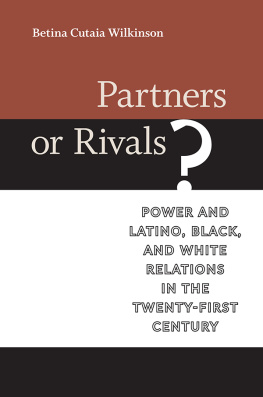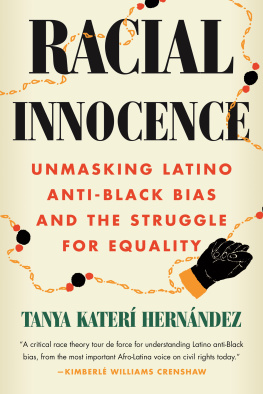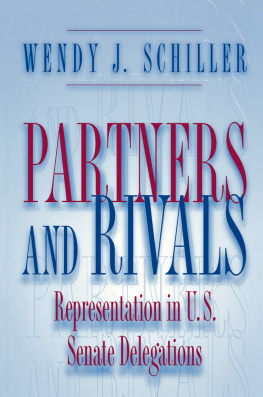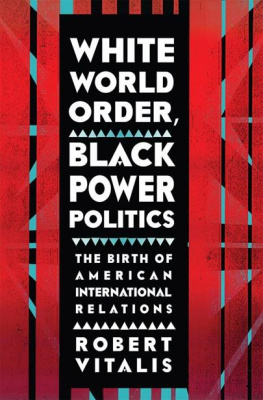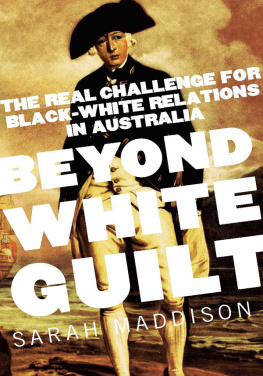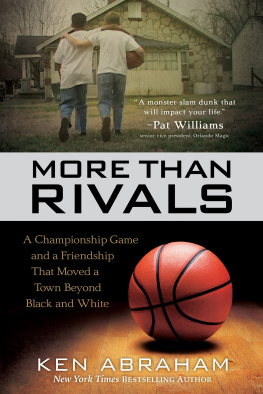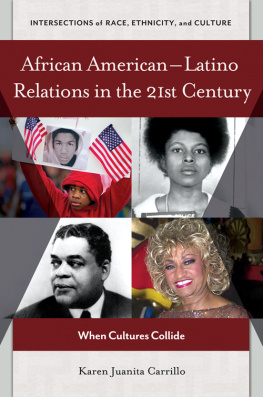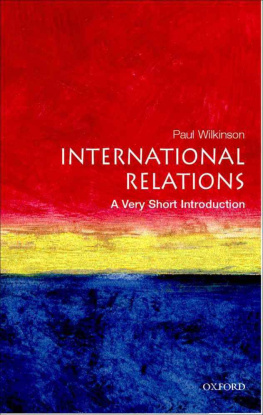University of Virginia Press
2015 by the Rector and Visitors of the University of Virginia
All rights reserved
Printed in the United States of America on acid-free paper
First published 2015
9 8 7 6 5 4 3 2 1
Library of Congress Cataloging-in-Publication Data
Wilkinson, Betina Cutaia, 1981
Partners or rivals? : power and Latino, black, and white
relations in the twenty-first century / Betina Cutaia Wilkinson.
pages cm. (Race, ethnicity, and politics)
Includes bibliographical references and index.
ISBN 978-0-8139-3773-1 (cloth : alk. paper)
ISBN 978-0-8139-3774-8 (e-book)
1. United StatesRace relations. 2. MinoritiesUnited StatesAttitudes. 3. Hispanic AmericansRace identity.
4. African AmericansRace identity. 5. WhitesRace identityUnited States. I. Title.
E184.A1W453 2015
305.800973dc23
2015010839
RACE, ETHNICITY, AND POLITICS
Luis Ricardo Fraga and Paula D. McClain, Editors
Acknowledgments
I have been thinking about and examining the questions in this book since I was an undergraduate student at Loyola University New Orleans. It was there where my interest in race relations and racial inequality was ignited and developed. Thus, I want to thank my sociology undergraduate advisors and mentors, Laurie Joyner and Ed McCaughan, for taking me under their wing and giving me significant attention, academic support, and encouragement to succeed in my undergraduate studies and beyond. I also want to extend a special thanks to my advisors and peers at Louisiana State University where I completed my graduate work. Jim Garand, my major professor, has provided me with a tremendous amount of intellectual and emotional support necessary to succeed in graduate school (and get the dissertation done), in the job market, and as an assistant professor. I would not have become the scholar that I am today without Jim. He has taught me how to be a great researcher, professor, colleague, mentor, and friend. I am also indebted to Johanna Dunaway, who read countless drafts of my dissertation chapters (which were later modified to blossom into this book project) and provided me with significant encouragement and support to complete this project. I also want to thank Robbie Hogan and Kirby Goidel, whose enthusiasm toward my research were unwavering. Special thanks go to Natasha Bingham for her friendship and encouragement all these years as well as for helping me to conduct several focus groups whose findings are presented in this book.
The research and financial support that I have received from Wake Forest University helped to make this project a reality. I would like to begin by thanking the Deans Office and the Office of Research and Sponsored Programs, which supplied funds to collect data used in this project. I am also appreciative of the advice and support from Sara Dahill-Brown, Neil DeVotta, Katy Harriger, Sarah Lischer, Michael Pisapia, Peter Siavelis, Kathy Smith, and Will Walldorf. I am particularly appreciative of the assistance of Emily Earle for her help with some last-minute editing and revisions. Students from my Latino Political Behavior and Racial and Ethnic Politics courses have also provided insightful comments on several of the chapters in this book project, so I would like to acknowledge the students enrolled in these courses.
Outside of the institutions where I have studied and worked, I would like to express my appreciation to several individuals. Thank you, Ansley Abraham, for helping me to succeed as a scholar through your faculty diversity programs commitment to the professional development and success of minority graduate students and professors. I want to thank Vince Hutchings for providing me with county geocodes for the 2004 National Politics Survey (NPS) and for 2004 contextual data at the county level. I am also indebted to Marisa Abrajano, Matt Barreto, Christina Bejarano, Ben Bishin, Vanessa Cruz, Martin Johnson, Jane Junn, Jessica Lavariega-Monforti, Taeku Lee, Jennifer Merolla, Melissa Michelson, Karthick Ramakrishnan, Ricardo Ramirez, Rene Rocha, Gabe Sanchez, Gary Segura, and Sophia Wallace. This book is a better project because of my interactions with them and their insights. I am also appreciative of Marcela Garcia-Castanon, Francisco Pedraza, Stella Rouse, and Ping Xu for their consistent support and friendship, which has been at the crux of my development as a researcher and teacher. I would like to thank Dick Holway at the University of Virginia Press for his early interest in this project, as well as the solid support of Luis Fraga and Paula McClain, the Race, Ethnicity, and Politics series editors.
I express my deepest gratitude to my family. My husband, Jasons, continuous encouragement and patience throughout my graduate school experience and now life as an assistant professor has not gone unnoticed. He has listened to my conference presentations, read over my papers, assisted me in developing my research interests, and kept himself busy for many weekends and weeknights while I finished this manuscript, all with an encouraging smile. I am thankful for the continuous love and encouragement of my sisters, Clarisa (now Sister Maria Victoria) and Marina, as well as Domingo, Rosa, and Vicente. Lastly, I want to thank my parents, Rosario and Gabriel, who came to this country to create a better future for their daughters and who have made many sacrifices for their well-being. Their continuous advice to be genuine, polite, hard-working, determined, and courageous has carried me very far in my academic career and life in general. I am grateful for and reminded of their strength and courage every day.
Portions of chapter 2 appeared in Betina Cutaia Wilkinson, Perceptions of Commonality and Latino-Black, Latino-White Relations in a Multiethnic U.S., Political Research Quarterly 67, no. 4 (2014): 90516.
Partners or Rivals?
Introduction
His father is white, neighbors say. His mother is Latina. And his family is eager to point out that some relatives are black.
The Washington Post on George Zimmerman
On the evening of February 26, 2012, Trayvon Martin, an unarmed black teenager with a hoodie, was shot and killed in Sanford, Florida, by George Zimmerman. Martin left the house he was visiting to purchase a few things from the local 7-Eleven, including a bag of Skittles and a can of iced tea. Zimmerman, a neighborhood watch volunteer and resident of Sanford, saw Martin walking back from the 7-Eleven and called the police. A recording of the 911 call made by Zimmerman illustrates that he thought that Martin looked suspicious and that Zimmerman was instructed not to follow Martin. What occurred afterward is not completely clear, though Martin was left fatally shot while Zimmerman suffered a bloody nose and a laceration to the back of his head (Alvarez 2012; Blow 2012). Once the mass media published details of Trayvon Martins shooting, hundreds of individuals (led predominantly by African American community leaders) participated in rallies and protests in the city of Sanford and throughout the United States in efforts to have Zimmerman arrested. Such was the support for Martin that a national wear a hoodie day was declared in late March resulting in thousands sporting hoodies to work, school, and in public settings (Preston and Moynihan 2012). In April 2012, Zimmerman was charged with second-degree murder for fatally shooting Martin, and in July 2013, a six-person jury found that Zimmerman was not guilty of second-degree murder or manslaughter because he could have been justified in shooting Martin since Zimmerman feared great bodily harm or death (Horwitz 2012; Alvarez and Buckley 2013).

